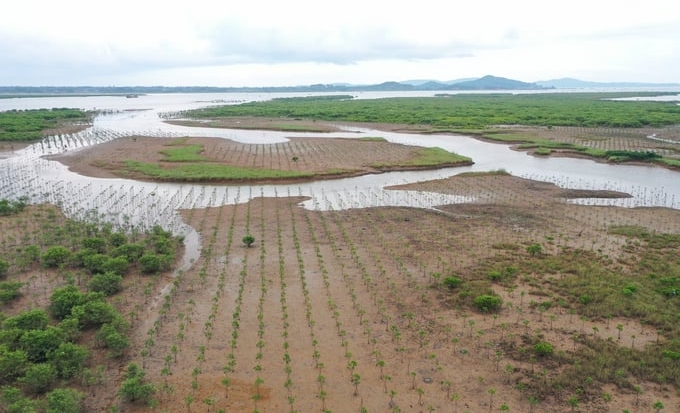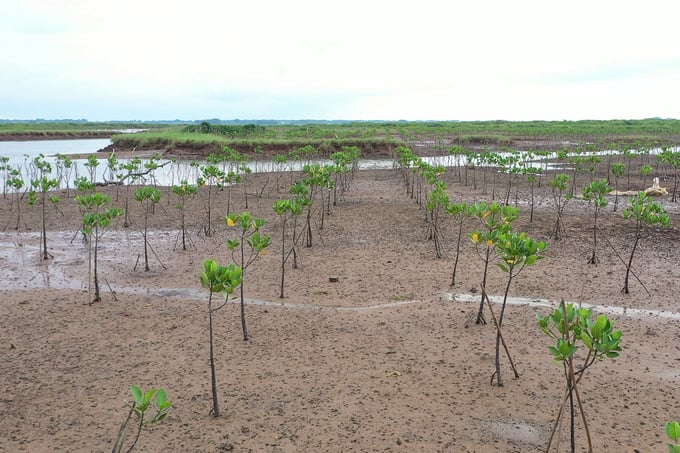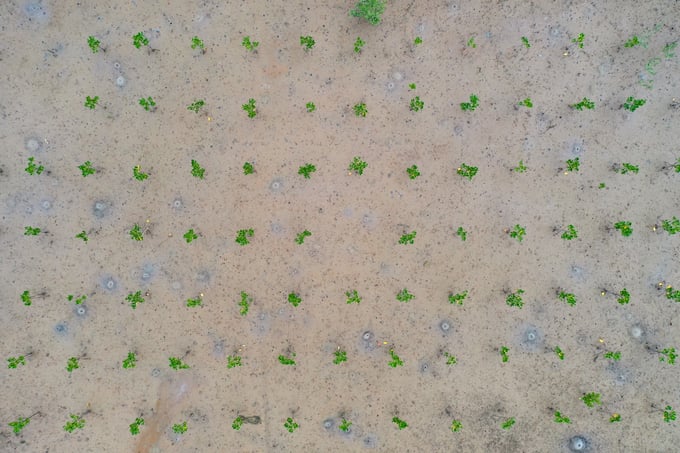May 20, 2025 | 11:20 GMT +7
May 20, 2025 | 11:20 GMT +7
Hotline: 0913.378.918
May 20, 2025 | 11:20 GMT +7
Hotline: 0913.378.918

Current status of coastal forests planted in phase 1 of the FMCR Project in Quang Ninh. Photo: Tung Dinh.
Considering the request of the Ministry of Agriculture and Rural Development and the appraisal results report of the Ministry of Planning and Investment related to the FMCR Project, the Prime Minister has decided to extend the project implementation period to 2026 with specific goals.
Accordingly, the project will organize effective management of resources through research and assessment of the current situation of using resources in coastal areas, building and transferring techniques to identify some main forestry tree species, supporting seed production equipment, and quantifying carbon services...
Plant, care for, and manage forests effectively to increase the ability to respond to climate change. Create mechanisms (through infrastructure construction, livelihood support, and technology...) to encourage households, communities, businesses, cooperatives, and local governments to participate in sustainable management and protection of existing forest resources.
Regarding the results after adjustment, the project will plant 1,384 hectares of new forests and restore 3,287 hectares of coastal protection forests. Protect coastal forests sustainably through forest management and protection contracts according to current policy mechanisms on 37,000 hectares. In addition, coastal protection forests in the project area have their boundaries marked on the ground, ensuring stability of the forest area and the boundary between protection forests and other types of land.
According to the adjustment, it is expected that about 16,000 households will directly benefit through mechanisms to encourage households and communities to participate in protecting, planting and restoring coastal forests to increase income and improve livelihoods. Coastal areas at high risk due to natural disasters, storms and floods causing great damage to residential and production areas will be invested in with structural solutions to prevent landslides, cause sedimentation, and create beaches for recovery, developing coastal forests.
Public land areas in the project area are supported by planting scattered trees through competitive proposals from mass organizations in the commune for planting, care, and long-term protection.

Planting coastal forests helps restore and protect ecology and improves and enhances people's livelihoods. Photo: Tung Dinh.
The project will also provide about 130 investment packages with an initial value of about USD 10,000 per package determined through a competitive selection process to create sustainable benefits for coastal communities from a combination of forest protection and livelihood improvement.
Another goal of the FMCR Project is to support at least 47 packages to upgrade critical infrastructure serving the production, processing and marketing of goods and services from coastal forests, with a value of no more than USD 600,000 per package.
These support packages will be for communes in 47 project districts to increase economic benefits and establish links to income-generating activities of local community groups participating in coastal forest protection. In addition, the project will provide at least 27 technology investment packages to serve production development and increase the income of coastal households participating in sustainable forest management, with a value of no more than USD 400,000 per package. Along with that is to raise awareness and encourage people and local communities to participate in sustainable management and protection of coastal forests after the project ends.
Regarding sustainable forest management, the adjusted FMCR Project will support seed production equipment/technology for research facilities to develop forestry varieties for afforestation. Survey, evaluate, and propose pilot implementation of a payment model for environmental services in coastal forests (mangroves) to serve research and development of a policy to only pay for ecological services in coastal forests.
The FMCR Project was approved in 2017, lasting 6 years, and is expected to end in 2023. However, due to many objective reasons, the actual time to implement the project up to this point is only more than 2 years. However, phase 1 of the project has achieved many remarkable results. According to Mr. Pham Hong Vich, Deputy Head of the Forestry Project Management Board (Ministry of Agriculture and Rural Development), by the end of 2023, new planting and restoration of 4,040 hectares of coastal forests that are currently growing and developing will be completed and have a survival rate that meets the prescribed requirements.
Regarding improving livelihoods and technology for production, the FMCR Project has completed investments in 50 livelihood packages, 22 investment packages in production technology, and 85 investment packages in infrastructure to serve people's daily lives and forest protection management. Project beneficiaries include individuals and households who are members of the community living in the project implementation area and are or have been involved in investment activities in afforestation, livelihoods, and production technology and infrastructure of the project and receive benefits from investment activities.
However, the Forestry Project Management Board representative also admitted some difficulties in project implementation in phase 2. Accordingly, forest planting and restoration activities are investment activities associated with the project. Trees are living creatures that will be greatly affected by adverse weather, such as prolonged heat and changes in tides and currents... so the care and maintenance of survival rate is fraught with many risks.

More than 4,000 hectares of coastal forests have been newly planted and restored in phase 1 of the FMCR Project. Photo: Tung Dinh.
However, the Forestry Project Management Board still determines the viewpoint of protecting and maintaining the sustainability of the project's achievements after 2026. Livelihood, technology, and infrastructure packages for development Production will be handed over to communities and local authorities of communes and districts participating in the project for continued replication, maintenance and long-term use.
Beneficiaries will continue to carry out production development activities with other mobilized capital sources based on the results from the initial support of the project. This will be the basis for forming a value chain, linking effective and sustainable production between local communities, businesses and markets. In addition, more than 40,000 hectares of planted, restored and protected forests affected by the project will be handed over to forest owners for long-term management and protection to enjoy direct economic benefits and other benefits from forest service values based on established forest management regulations and linkage mechanisms.
According to the adjustment approved by the Prime Minister, the FMCR project will have a total project investment adjusted to USD 95 million, equivalent to VND 2,248 billion. Of which, the WB loan from the IDA source is USD 65 million, equivalent to VND 1,538 billion, including 100% allocated by the central budget of USD 18,760 million and USD 46,240 million from local loans.
The counterpart capital will be VND 710 billion, equivalent to USD 30 million, including USD 11,151 million allocated by the central budget to the Ministry of Agriculture and Rural Development and USD 18.849 million allocated by the local budget.
Translated by Huong Giang

(VAN) For years, the CRISPR-Cas9 genome technology has been reshaping genetic engineering, a precision tool to transform everything from agriculture to medicine.

(VAN) Vietnam aims to become a 'leader' in the region in the capacity and managing effectively soil health and crop nutrition.
![Reducing emissions from rice fields: [Part 1] Farming clean rice together](https://t.ex-cdn.com/nongnghiepmoitruong.vn/608w/files/news/2025/05/05/z6509661417740_a647202949c539012a959e841c03e1d3-nongnghiep-143611.jpg)
(VAN) Growing clean rice helps reduce environmental pollution while increasing income, allowing farmers to feel secure in production and remain committed to their fields for the long term.
/2025/05/19/5136-1-144800_230.jpg)
(VAN) The Nghe An Provincial People's Committee has just approved the list of beneficiaries eligible for revenue from the Emission Reductions Payment Agreement (ERPA) in the North Central region for the year 2025.

(VAN) 14 out of 35 domesticated elephants in Dak Lak province have had their living conditions improved, with 11 of them currently participating in the non-riding elephant tourism model.

(VAN) Muong Nhe Nature Reserve hopes that being upgraded to a national park will lay the foundation for forest protection efforts to be carried out in a systematic, modern, and sustainable manner.
/2025/05/16/3923-2-171845_52.jpg)
(VAN) Lower costs, higher yields, and improved soil quality are outstanding benefits that soybeans bring when integrated into the crop rotation system.